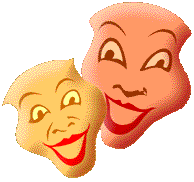Theatre Companies & Play Production
A Guide to Structure

Technical Staff
Technical Director
The Technical Director is in charge of coordinating all the technical elements of the production, including lights, sound, and all scenic elements and may be on the Board of Directors of the Company. S/he supervises the purchasing of supplies and equipment, the construction and painting of the sets, acquisition or building of properties, shifting, repairing and striking of the scenery and props, and the work of all technical crews.
Stage Manager
The Stage Manager (SM) is possibly the most difficult and least rewarded position in theatre. But every director and actor knows how essential a good SM is to the success of a show. The Stage Manager has complete responsibility for the coordination of everything that happens onstage and backstage in preproduction, during rehearsals, and in performance. In addition, s/he is the director's right hand and the voice of the director in his/her absence, assisting him/her in preproduction planning (along with the Assistant Director), auditions and rehearsal, and is the liaison between the director and the design staff and, often, between the director and the cast. His/her responsibilities include but are not limited to:
sign-in sheets and rehearsal reports, and maintaining contact with the cast and
crew,
playing text and stage business, together with such cue sheets, plots, daily
records, etc. as are necessary for the actual technical and artistic operation of the
production. Therefore, all script changes must go through the Stage Manager, as
s/he is responsible for recording all technical an actors' cue and line changes into
the Prompt Book,
preparing the rehearsal areas; taping the floor (when necessary and possible) to
indicate the scenery positions and playing areas and placing rehearsal chairs
where furniture and props will be; prompting; taking and giving line and staging
notes,
cues,
the show, including lighting, sound and other technical cues; set changes; calling
places and entrances, starting and intermission times and curtain calls.
In larger professional productions there may be a Production Stage Manager (PSM), as well as a Stage Manager. The Production Stage Manager is responsible for the show as a whole, and may be the Company Stage Manager as well, while the Stage Manager does the day-to day duties of an SM. Responsibilities and division of dutys between the PSM and SM vary from company to company, but generally, during performance the PSM inspects the preshow set-up for safety and accuracy, then watches the performance from the audience taking production notes for the cast and technical crew. In this way s/he acts as the director's alter-ego while the show is in production, once the director has left to go on to his/her next job. The SM then calls the show and runs it during performance. In some companies, the PSM calls the show and the SM runs it from backstage.
Asssistant Stage Manager / Production Asssistant
The Stage Manager is assisted by the Assistant Stage Manager (ASM) and Production Assistant (PA). There may be several of these, as needed, and determined by the size and complexity of the show. They customarily take on such responsibilities as prompting in rehearsal, props tracking, assisting in set changes and technical cues backstage. In some cases (such as Showcases, when personnel are at a premium), the First ASM may call the lighting and sound cues from the lighting booth while the SM or PSM runs the show from backstage with the assistance of the other ASM's and PA's . Or the SM will call the show and the ASM will run it from backstage. In most cases, it's a decision that is made by the SM. ASM's may also be asked to run the lighting or sound boards or take small onstage roles.